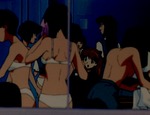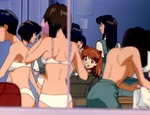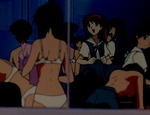FGC:Episode 09 Cut 010: Difference between revisions
UrsusArctos (talk | contribs) No edit summary |
The wayneiac (talk | contribs) No edit summary |
||
| Line 44: | Line 44: | ||
|comment=The "matured early" comment comes off somewhat ironic, considering Asuka's need to be seen as adult, but incapability to truly be one. }} | |comment=The "matured early" comment comes off somewhat ironic, considering Asuka's need to be seen as adult, but incapability to truly be one. }} | ||
{{FGC:Comment|name= | {{FGC:Comment|name=thewayneiac | ||
|comment=}} | |comment=Since they're going out of their way to be cliched here, I'm surprised this sequence didn't end with a broken camera and Toji and Kensuke covered with bruises. }} | ||
|collapsible_comments= | |collapsible_comments= | ||
Latest revision as of 21:36, 25 November 2021
| Screenshots | Cut # | Description/Dialogue | Commentary | |||||
|---|---|---|---|---|---|---|---|---|
| 010 |
|
|




